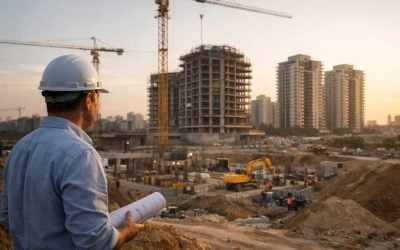If home prices are climbing, why are apartments sitting unsold?
That’s not a riddle, it’s the strange truth of Israeli real estate in 2025. One of the hottest property markets in the world is flashing signals in every direction. Prices are up, sales are down, demand is strong, supply is stronger. Confused? You’re not alone.
Let’s unpack what’s really going on behind the headlines, and why the answers matter for everyone from first-time buyers to veteran investors.
A Market That Won’t Sit Still
It’s been a wild ride for Israeli real estate over the past two years. After a short dip during the 2023 war, home prices didn’t just recover, they accelerated. The first months of 2025 saw prices for both old and new homes rise between 6–8% compared to last year.
But here’s where it gets weird.
While prices continued to climb, new home sales cooled dramatically after a December rush caused by a looming tax hike. In January 2025, fewer than 8,000 apartments were sold, a drop of nearly 50% compared to the previous month. And the number of unsold new apartments? Almost 80,000. That’s nearly two years’ worth of supply.
How can prices rise when supply is stacked high and sales are slow? That’s where the story deepens.
Balloon Loans and Bursting Bubbles
One major reason prices stayed high, developer financing tricks. Ever heard of a “balloon loan”? It’s a payment plan where you pay 20% now and the rest only when the apartment is finished, sometimes years later. Sounds great, right? It lets buyers stretch their budget without facing mortgage payments upfront.
Problem is, it also masks the true affordability problem. Developers were still able to “sell” units, even though many buyers couldn’t actually afford the real cost long-term. The Bank of Israel noticed, and starting May 2025, these creative financing schemes are heavily restricted.
Translation? Many buyers won’t be able to delay the financial pain. Demand for new apartments is expected to drop, and developers sitting on massive inventories could start feeling the pressure to cut prices.
Renters Are Feeling the Heat
While home buyers hit the brakes, renters are slamming the gas. Rents in major cities are rising fast, especially for new leases. In Tel Aviv, a modest 3-room apartment can cost close to ₪7,000 a month. That’s over $1,800 USD, and that’s on the lower end.
Why? Because the cost of buying is so high, more people are staying in the rental market longer. And with fewer units being built fast enough to meet demand, rents are shooting up. This isn’t just annoying, it’s reshaping how young families plan their lives. Renting used to be a step toward buying. Now, for many, it’s a long-term destination.
Building More, With Less
Israel’s skyline is rising, but behind the cranes, a storm is brewing. Construction costs are up around 6% year-over-year. Labor is short, especially since tens of thousands of Palestinian workers were blocked from entering after the war. Efforts to bring in foreign workers haven’t been enough to fill the gap.
Add tighter credit and rising material prices, and developers are in a squeeze. They want to build, but it’s never been more expensive, or complicated. Permits take time. Bureaucracy drags. And planning freezes, like the stalled TAMA 70 urban renewal program, slow everything down further.
Even if a developer has land, funding, and buyers, they might still be stuck in red tape.
Tel Aviv, Jerusalem, and the North, Three Different Worlds
Not all cities are created equal. Let’s zoom in:
- Tel Aviv remains king of the hill. Average home prices top ₪5 million, and demand from tech professionals and foreign buyers keeps the market hot. But the surrounding Central district? That’s a different story. Inventory is piling up, and price growth is cooling.
- Jerusalem is undergoing a construction renaissance, from the First Station expansion to the Gateway Towers. Prices are rising more slowly, but new supply is finally coming online. Rents are high, but relatively stable, and foreign buyers continue to view the city as a long-term investment.
- Haifa and the North are the dark horses. Thanks to massive government investment in new trains and roads, prices are up more than 10% year-over-year. For buyers priced out of the center, these regions are becoming real contenders, especially with remote work now more common.
Government Moves, Help or Hindrance?
You’d think the government would be laser-focused on fixing the housing crisis. And to be fair, there’s been action, just not always in sync.
- Taxes Up, The VAT (Value-Added Tax) on new homes rose to 18%, and municipal property taxes (Arnona) jumped over 5% on average, 12% in Tel Aviv. Capital gains taxes are also climbing. That puts more pressure on buyers, sellers, and developers alike.
- Financing Rules Tighten, As mentioned, developer-backed loans (those balloon-style 20/80 deals) are now restricted, especially if too many buyers in a project use them.
- Urban Planning Delays, The Tel Aviv Metro, one of the biggest infrastructure projects in Israel’s history, is facing delays over planning disputes. That stalls not only transportation, but hundreds of thousands of housing units planned around future stations.
- Settlement Expansion, At the same time, 13 former outposts in the West Bank were legalized as full-fledged settlements. Whatever your stance politically, this has real impact, it shifts development priorities and government resources, often away from the main housing centers.
So, Is This a Bubble?
The honest answer? No one knows yet.
Some say prices will keep rising 10–15% in 2025. Others predict a plateau or even a soft drop in certain markets, especially if developers are forced to slash prices to move unsold units.
But what’s clear is this, Israel’s real estate market is out of balance. Years of fast growth, limited supply, and cultural urgency to “own property at any cost” have created a system that works for investors, but leaves many families out.
For now, the market is stable. But stability doesn’t always mean sustainability.
Too Long, Didn’t Read (TL,DR):
- Home prices are up, but sales are slowing, especially for new builds.
- Rental prices are surging as people postpone buying.
- Developer balloon loans are being restricted, which may trigger a slowdown.
- Construction is booming, but costs, labor shortages, and bureaucracy are dragging delivery down.
- Government policy is active but fragmented, with some moves helping and others hurting the housing supply.
- Regional gaps are widening, Tel Aviv stays elite, the North is rising fast, and Jerusalem is building big.
- Affordability is the central issue, with wages far behind prices and mortgage costs at record highs.



